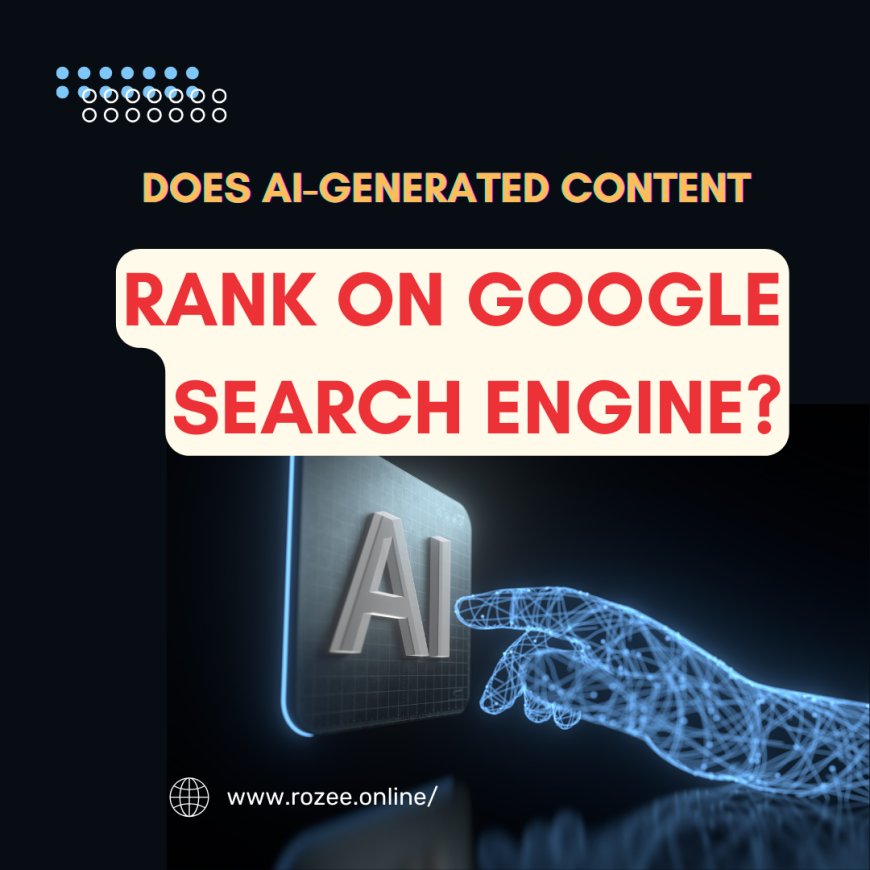Does AI-Generated Content Rank on Google Search Engine?

In recent years, the fast growth of artificial intelligence has caused many debates, especially about whether AI-generated content can rank well on Google. If you are asking about Google's AI content rank, then you are not the only one.
Marketers, content creators, and businesses often wonder if AI content can rival human writing and rank well in search results. This guide explores the facts behind this crucial topic.
In this blog post, we will explore how AI-generated content can rank on Google, what Google’s approach to AI content is, and how you can create high-quality AI content that can rank well on the Google Search Engine.
What Is AI Generated Content?
Before we answer whether AI-generated content can rank on Google, let’s start with the basics.
AI-generated content is articles, blog posts, product descriptions, or any written material created using artificial intelligence tools like GPT models.
These AI systems are educated to replicate human writing by studying vast amounts of data.
AI can produce text but often falls short of matching human writers, especially in SEO.
How Does Google Rank Content?
To understand how Google ranks content, it is essential to know that Google uses a complex system of algorithms that looks like this:
- Relevance: The content should match with that what users are searching for.
- Quality: It should be valuable, informative, and precise.
- Authority: Content from trusted sources usually ranks better.
- User Experience: Fast-loading pages, mobile friendliness, and a smooth user interface are essential.
So, how does this apply to AI content? If your AI-generated text is relevant, valuable, and optimized for a good user experience, it can rank on Google.
However, it will still need to compete with talented writers who create interesting and detailed content.
How does Google use AI in Search?
It is interesting that Google uses AI in its search engines. Google uses artificial intelligence to determine user intent, analyze the accuracy of the data, and deliver the most relevant results.
Bidirectional Encoder Representations from Transformers and the Multitask Unified Model are two methods that Google utilizes to understand search requests better.
Therefore, when you ask whether AI content ranks on Google, keep in mind that AI is already an important part of Google's operations.
This means that as long as the information is relevant and of high quality, AI-generated content can work with Google AI-based technologies.
What Factors Impact How Google Ranks AI Content?
If you're thinking about using AI tools for creating content, here are a few essential factors to make sure your content can rank well:
- Originality: Avoid creating content that sounds repetitive or generic. AI tools can sometimes make content that isn't unique enough to stand out.
- Optimization: Make sure to add relevant keywords naturally in your AI content. For example, include phrases like "How does Google rank content" and "How to rank on Google" throughout your article.
- Readability: One problem with AI content is keeping a natural tone. If it sounds like a robot wrote it, users (and Google) might not interact with it. Always edit AI content to make it sound more human.
- User Intent: Focus on answering the exact questions users are searching for. If your AI content directly answers user intent, it will likely rank well.
Can AI Content Rank? A Real-World Example
To answer the question of whether AI content ranks on Google,
Background:
A mid-sized digital marketing agency wanted to test AI-generated content that could compete with their human-written articles.
They decided to use an AI tool to create content on topics related to their niche, such as 'how to rank on Google and how Google ranks ads’. The goal was to see if the AI articles could rank well and get organic traffic.
Strategy:
The agency created 20 blog posts using an AI writing tool. These articles were optimized with relevant keywords, such as "Does AI content rank on Google?" and "How does Google rank pages?"
To give the AI-generated content a better chance, they manually checked each article to ensure the tone felt natural and the information was correct. They also improved SEO using proper headings, meta tags, and internal links.
Results:
In the first month, the agency saw mixed results. Here's what they found:
- Initial Rankings: Within three weeks, around 30% of the AI-generated articles started to rank on Google's first and second pages. The content focused on specific, long-tail keywords, which helped it rank quickly.
- Traffic and Engagement: Although the AI articles brought in visitors, the bounce rate was a little higher than that of their human-written content. This was because AI content lacked the personal touch and emotional connection that human writers excel at.
- User Retention: Articles that were edited and improved after being created by AI did better. These edited articles kept users' attention longer, improving rankings over time.
Lessons Learned:
The agency learned from this experiment that although AI content can rank well on Google, it requires the human touch to increase user engagement.
Articles using only pure AI content performed worse. However, by investing time in editing, providing personal thoughts, and improving the material, they were able to increase ranks and keep readers on their site longer.
How to Improve Google Rankings Using AI Content
If you're planning to use AI-generated content, you’ll need to make some effort to ensure it can rank well. Here are some tips:
- Keyword Research: Use tools to find the right keywords, like how AI content ranks on Google or how Google ranks reviews. Make sure to add these keywords naturally in your content.
- Add a Human Touch: AI content might lack the emotional connection that human writers bring. Try adding personal stories, real-life examples or a conversational tone to make it more relatable.
- Focus on SEO Best Practices: Use proper headings, meta descriptions, alt text for images and internal links to improve your SEO content performance.
- Fact-Checking: AI tools might not always give accurate information. Always double-check facts, mainly if your content includes statistics, dates, or industry insights.
How Does Google Rank Pages with AI Content?
When it comes to how Google ranks pages with AI-generated content, it's all about following Google's content rules.
Even though AI can create content quickly, the focus should always be on quality. Here's how you can improve your chances:
- Create Long-Form Content: Google often prefers longer articles that provide more details.
- Engage Users: Content that keeps users on the page longer tends to rank higher. Make sure your AI content is engaging and keeps readers interested.
- Use Analytics: Track your page performance. You can see how well your AI content is performing and where you might need to make improvements with the use of tools like Google Analytics.
Common Mistakes When Using AI for Content
It's easy to make mistakes when using AI for content creation. Here are a few things to avoid:
- Over-Optimization: Stuffing your content with keywords like Does AI content rank on Google can hurt your rankings instead of helping.
- Ignoring Quality: Just because AI can create content quickly doesn't mean it’s good. Always proofread and improve AI content before publishing.
- No Personalization: AI content can sound robotic if you're not careful. Add a human touch to make it more interesting.
Will AI Content Change SEO in the Future?
Although AI content can be helpful, it is not an instant solution for Google's ranking. Search engines will continue selecting information that offers people real value as they become more intelligent.
The material's quality, use, and relevancy will be more critical than whether AI or people produced it.
Combining AI speed and strength with human creativity and intelligence is ultimately the best action. By achieving this balance, you can still provide material that your audience will find engaging while improving your rankings.
Final Thoughts
Although AI-generated content can be a handy tool for increasing productivity, it must be optimized, humanized, and followed by Google content guidelines to rank highly in search results.
We'll probably see more machine-generated content as AI technology advances.
However, for now, the most effective strategy for achieving top Google ranks is combining human creativity with AI efficiency.




![KDP Publisher Rocket Website Review [2024]: A Complete Guide for Self-Publishing Authors](https://rozee.online/uploads/images/202411/image_430x256_673c72863d074.jpg)

![Latest Jobs in KRL Hospital 2024 | Apply Online [hr1384.com.pk]](https://rozee.online/uploads/images/202411/image_430x256_673b0a7f6a4ab.jpg)
![Join Pak Navy as a PN CADET Permanent Commission 2025-A [Apply Online]](https://rozee.online/uploads/images/202411/image_430x256_6735b76c32aae.jpg)

![Why Freelancing Is Gaining Popularity? [Rise of the Freelancer Economy]](https://rozee.online/uploads/images/202411/image_430x256_674866ea992ea.jpg)












![Why Freelancing Is Gaining Popularity? [Rise of the Freelancer Economy]](https://rozee.online/uploads/images/202411/image_140x98_674866eaae283.jpg)
